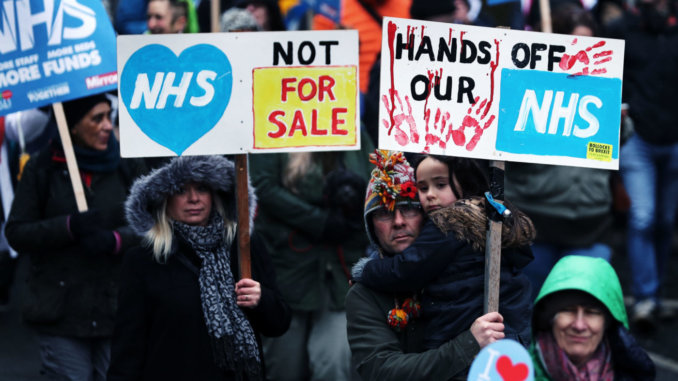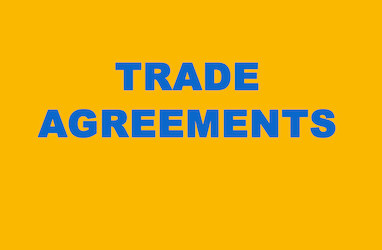
This article was originally given as a speech by Gay Lee, a nurse and a campaign member of Lambeth Keep Our NHS Public, at the Global Justice Now meeting on 13th February in London.
Keep Our NHS Public has been campaigning for the removal of the NHS from future trade deals, including presenting a petition with over one million signatures to the Conservative Party telling Trump to keep his hands off our NHS in December. We have also worked with Global Justice Now, and others to ask politicians to pledge to protect the NHS from trade deals. The talk also focused on other threats to public health that could be caused by a trade deal that does not priorities tackling climate change and the safety of our food.
The slogan that recently caught everyone’s attention was: ‘Everything is on the table in the US trade deal’. So said Trump – quickly countered by Johnson’s ‘the NHS is not on the table’, which just shows the political importance and sensitivity of this issue.
So why is the NHS even at risk of being on the table?
From the point of view of whether the NHS can be included in trade deals, put very simplistically it’s almost certainly the case that technically the NHS is no longer a public service. Why do I say that?
The NHS was defined as a service ‘supplied in the exercise of government authority’ under the World Trade Organisation’s General Agreement on Tariffs and Trade. This meant it was safeguarded from inclusion in trade agreements as long as it was ‘supplied neither on a commercial basis, nor in competition’.
But along came the marketisation of the NHS beginning with the introduction of the purchaser/provider split in the late 80s. This was where one arm of the NHS commissioned and contracted services from the provider arm of the NHS (and later from private providers too). So, its protection from trade as a public service under the definition above could no longer be assumed. Any remaining doubt about this seemed to be removed in 2012, when Section 75 of the notorious Health and Social Care Act (HSCA) enforced and entrenched competition between providers, including foreign ones. And now increasingly private commissioners are on the scene too. The NHS, and health in general, has become a marketised commodity to be bought and sold.
But we must ask the question: does Trump really want our beloved NHS?
Literally speaking the answer is probably ‘no’, though we talk glibly of it being ‘on or off’ the table.
The NHS is a complex institution but perceived by many as simply a provider of treatment and care to individuals in need, with underlying (usually unvoiced) principles of being free at the point of use, universal, comprehensive, and publicly provided (socialism in action!). But now it is battered and bruised and all those principles are broken to some degree – thanks to Conservative ideology, policy and austerity. Why would Trump want it?
Because there are lots more aspects to our ‘health’ than ‘the NHS’ – some intricately bound up with the NHS, some separate but associated. So, there’s lots that the USA wants from our health system – and reason to demand ever-easier access:
Data – Trump wants all that great wealth of health and patient data for use by financially driven researchers, drug companies and health insurance companies.
Patents – Trump wants control of the patents – intellectual property rights – to the health-related creations so effectively spawned in the fertile breeding grounds of our UK not-for-profit system. But he also wants to protect US intellectual property and he particularly wants to extend the patents for US pharmaceuticals – to keep prices high and to prevent manufacture of cheaper, unpatented versions of drugs.
Public procurement – He wants access to public procurement markets – to provide what the NHS and associated bodies and other public services need to buy in, to keep services going – equipment and drugs being the most obvious. And we know from the secret, pre-negotiation documents leaked before the election that – amongst many other things – he wants us to buy US Pharma’s drugs at higher and higher prices.
Skills and knowledge – He wants easier access to the brilliant health academics and clinicians we nurture – but probably not under their current terms and conditions of employment.
Deregulated standards and public health – On public health and health promotion, he wants a trade deal to make money out of the things that keep us healthy and prevent illness – safe food and farming, regulations on alcohol and tobacco. And he doesn’t want to negotiate on environmental issues – crucial not only for our health but the very existence of the planet
Social care market – And don’t forget Trump will want access to the personal social care ‘market’ too – now part of the Department of Health & Social Care – and almost fully privatised in terms of home care and care home.
NHS ‘support services’ – What is much more hidden from the public than the privatisation of NHS clinical services (and so difficult to campaign about) is the intrusion of huge private companies into the commissioning arm of the NHS as ‘support services’ for the current regionalisation of the NHS into 44 autonomous bodies – integrated care systems (ICSs). The global ‘big four’ management and finance companies are advising and consulting on this regional restructuring and they will likely run the new so-called integrated health bodies eventually – PWC, KPMG, EY, Deloiite are all involved – and so too are McKinsey and Optum. (Optum is the UK arm of UnitedHealth – the US healthcare company for which Simon Stevens was a senior executive prior to becoming head of NHS England in 2014).
So ‘keeping the NHS off the table’ is only a slogan. The bottom line and harsh reality is far more difficult
There will be huge complexity in the legal drafting of this trade agreement and USA lawyers will almost certainly be cleverer than ours, so:
- How do we legally define the NHS and health?
- Can we keep health or the NHS out of the whole deal?
- Or must we keep different bits of ‘health’ out of different chapters of the Agreement?
- The so-called negative listing issue is dangerous: we know that Trump wants everything to be included in his trade deal unless it is specifically excluded – including future health services not yet invented! How can that possibly work for everything that comes under the Dept of Health and Social Care?
- And trade rules can ‘lock in’ services already under commercial contracts which can never be reversed – making a return of the NHS to a fully public service a legal impossibility without crippling financial sanctions.
Can and should we campaign against health and other public services in this deal as part of stopping it altogether?
The NHS is still a beloved institution which Johnson and Co sell off at their political peril. Combine this with the challenges of ‘keeping the NHS out of trade deals’ and the NHS becomes an important focus for the wider campaign against this toxic US trade deal.
So how do we campaign against it?
- Against all the most harmful aspects individually or against the whole of trade deal? – We must campaign on both simultaneously.
- Joining allies to campaign for an alternative model of trade – a model which excludes and protects all public services which deliver basic human rights for people; and keeps all the products and services associated with them under much tighter regulatory control.
Ending on an optimistic note:
We can take heart from our campaigning against TTIP – the Transatlantic Trade and Investment Partnership – a few years ago. TTIP was stopped in its tracks. Health and public services were important stumbling blocks to TTIP being passed and were used to prevent its success. And collective action was the key to its failure. Can we use those lessons and stop this trade deal?






Leave a Reply